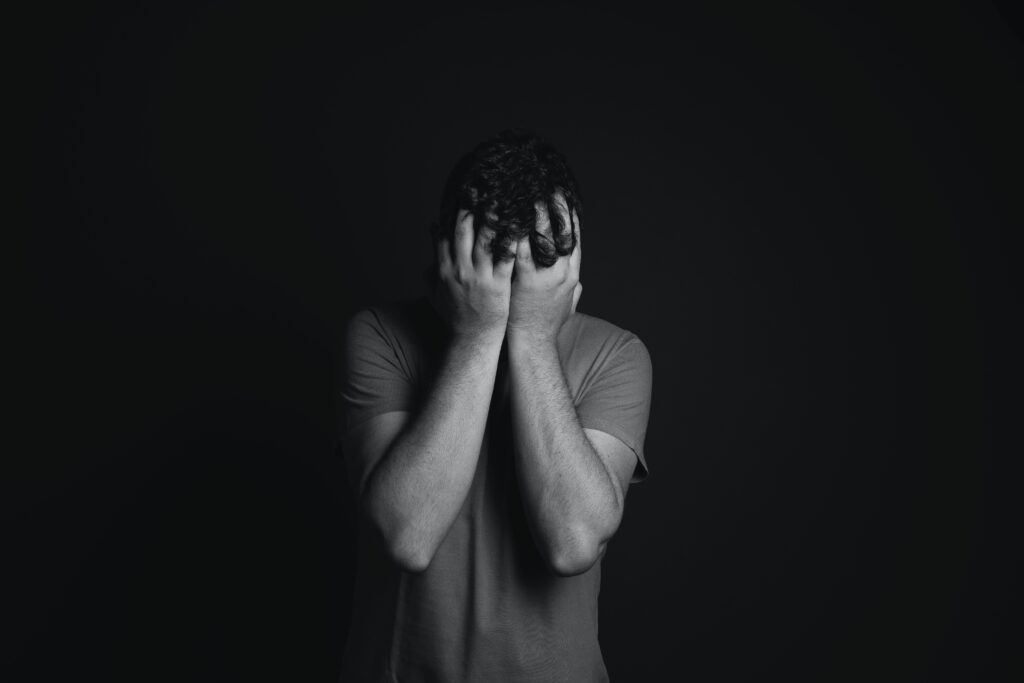6 Signs Someone is Severely Depressed

Depression may take on many faces – detaching from loved ones, skipping meals, oversleeping, inflicting self-harm, and self-sabotage. All of these forms may make it extremely hard for a person to perform daily tasks.
Do you often have intrusive thoughts of self-harm? Do you experience a constant feeling of helplessness? Are you suffering from immense fatigue that stops you from fulfilling even the simplest chores? If yes, these might be warning signs that you may be suffering from depression. Please read more to identify 6 signs that someone is severely depressed.
Disclaimer: This is a disclaimer that this article/video is for informative purposes only. It is not intended to diagnose or treat any condition. Please reach out to a qualified healthcare provider or mental health professional if you are struggling.
1. They feel sad for no reason.

Have you ever experienced persistent and intense sadness for no specific reason? Have you cried randomly these past few days? If so, then you may be experiencing Melancholia, which is closely linked to depression.
Melancholia is a lifetime depressive syndrome that is characterized by uncontrollable crying spells, frequent agitation, cognitive impairment, and emotional disturbances. Albeit having similar symptoms with Severe Depression, Melancholic diagnosis is far more consistent, predictive, and treatable as it responds well to psychotherapies, placebo medication, and social intervention.
If overlooked, it may, unfortunately, progress into worse issues like Bipolar Disorder and Persistent Depressive Disorder.
The best way to identify if you are suffering from severe depression caused by Melancholia is through the help of a medical professional to avoid false diagnoses.
There are also several questions you may ask yourself beforehand: Has your daily routine changed due to random sad spells? Is your sleeping pattern normal? Also, are you constantly left with a feeling of hopelessness?
2. They are no longer interested in the things they used to be so passionate about.

Slowly losing the spark you’ve had about something you used to be impassioned about may feel devastating, and this steady loss of interest may eventually lead to self-sabotage, as somehow your brain has convinced you that you do not deserve the happiness you get from it anymore.
This may be a warning sign that you are suffering from severe depression.
Severe depression may make you feel like you’ve lost a part of yourself for good, and this can cause emotions like contempt and frustration. It might seem as if the world has turned against you. Over time, the feeling may even become too overbearing to the point where suicide might become an exit option, but we would always like to remind you that help is within reach through close friends, family, or a medical professional.
3. They are often moody and irritable.

A severely depressed person may also demonstrate frequent irritability, mood changes, and hopelessness. The tiniest inconveniences may cause a breakdown and a negative outlook of their own self. However, this is not something that should be taken against them. These kinds of thoughts can be uncontrollable without preventive measures.
How about you? Have you been feeling extremely down and moody lately? Has it negatively affected your relationships and self-esteem? Has someone called you out for being uncooperative, distracted, and unreasonably irritable? If yes, then you might need to consider seeking proper medical help.
4. There are noticeable changes in their body.

Have you ever heard people say that depression is all in your head? That depressed people are just faking illness for attention?
This misconception is very detrimental to severely depressed people and is one of the main reasons why mental health is still undervalued especially by people who are not educated enough about the topic.
Visible psychomotor and physical symptoms can actually be observed on a severely depressed individual. This includes chronic pain, fatigue, rapid weight loss, reduced libido, appetite changes, stomach problems, and sleep disturbance.
Researchers are still in the pursuit of finding out how depression influences the physical state. Along the way, there have been several studies that further discuss this phenomenon.
In 2015, a study theorized that this may be because severely depressed individuals have lower pain tolerance. Another suggests that inflammation causes the brain to perceive pain at a higher intensity.
If you know someone with a rapid physical change like those mentioned above, or you yourself struggle with these, a visit to a medical professional is encouraged to determine the cause.
5. They no longer have the energy to do anything.
People with severe depression may also experience long hours of mental and physical inactivity. It’s not because they’re lazy, but they physically do not have the energy to do anything productive.
Do you spend hours doing nothing but laying in your bed or being on your phone? Have you tried changing this behavior? Do you find it difficult? This is what physical inactivity looks like, and this may happen to anyone. It may be induced by a loss of purpose, low self-esteem, and previous trauma.
Aside from physical inactivity, a rapid mental decline may also happen and can make it difficult for you to perform simple activities like opening a water bottle or counting coins. In medical terms, this is referred to as psychomotor retardation. Without proper help, this can lead to a loss of the sense of self and may allow intrusive thoughts of self-harm. If you are experiencing this, it is recommended to have support and understanding from your loved ones and medical intervention.
6. They perform acts of self-harm.

Is suicide a thought that comes inside your mind? Do you have strong urges to hurt yourself during mental breakdowns? If you have undergone these experiences or maybe even worse, then you are most likely suffering from severe depression and are encouraged to reach out for help.
For individuals with severe depression, suicide may appear to be an escape. Suicide accounted for close to 1.5% of all deaths worldwide, bringing it into the top 20 leading causes of death in 2015 (World Health Organization, 2017).
Do you know someone who is exhibiting a farewell type of behavior? Are they giving out possessions and bidding goodbyes to those who are close to them? Do they talk about death in a nonchalant, sometimes fascinated way? Are they withdrawing from communication with their loved ones?
Are any of these points something you can relate to?
Please keep an eye open for these symptoms in yourself and anyone you know, because Severe Depression should never be taken lightly. You are never alone.
Suicide Hotlines:
America: 1-800-273-TALK (8255)
Canada: 1-866-531-2600
Australia: 13 11 14
United Kingdom: +44 (0) 8457 90 90 90
Malaysia: 03-76272929
Beijing: 0800-810-1117
Hong Kong: +852 28 960 000
Japan/Tokyo: 81 (0) 3 5286 9090
Brazil: 55 11 31514109 or (91) 3223-0074
Mexico: 9453777
Germany: 0800 111 0 111
Russia: (495) 625 3101
India: 91-22-27546669
Iran: 1480
South Africa: 0800 12 13 14
Philippines: 1553 or 0917- 899- 8727 or (02) 7-989-8727
Thailand: (02) 713-6793
Singapore: 1-767
Korea: 1588-9191
Indonesia: +62 813 14988214
China: 0800-810-1117
Vietnam: 18001567
REFERENCES:
Bruce, D. F., PhD. (2008, June 19). Major Depression (Clinical Depression). WebMD. https://www.webmd.com/depression/guide/major-depression
NIMH » Depression. (2021, July 27). NIMH. https://www.nimh.nih.gov/health/topics/depression/
Parker, G., et. al. (2010). Issues for DSM-5: whither melancholia? The case for its classification as a distinct mood disorder. The American journal of psychiatry, 167(7), 745–747. https://doi.org/10.1176/appi.ajp.2010.09101525
Suicide Warning Signs and Risk Factors. (n.d.). Verywell Mind. Retrieved July 27, 2021, from https://www.verywellmind.com/suicide-warning-signs-and-risk-factors-1067525
Why Melancholic Depression Is Often Treated With Medication. (n.d.). Verywell Mind. Retrieved July 27, 2021,from https://www.verywellmind.com/what-is-melancholia-379852
Cherney, K. (2018, September 18). Psychomotor Retardation (Impairment). Healthline. https://www.healthline.com/health/psychomotor-retardation#symptoms
Walker, A. K. et. al. (2014, January). Neuroinflammation and Comorbidity of Pain and Depression. Pharmrev.Aspetjournals. https://pharmrev.aspetjournals.org/content/66/1/80
World Health Organization. (2017). Depression and Other Common Mental Disorders. https://apps.who.int/iris/bitstream/handle/10665/254610/WHO-MSD-MER-2017.2-eng.pdf





Responses